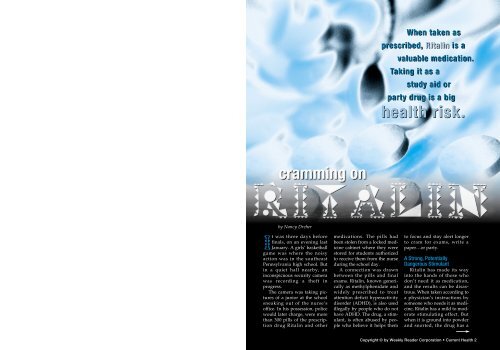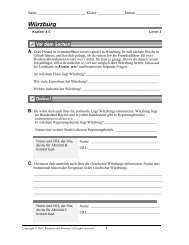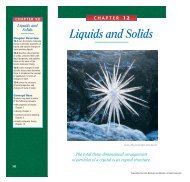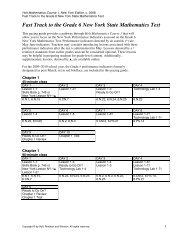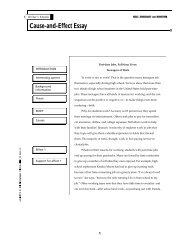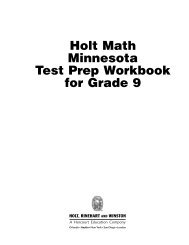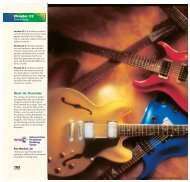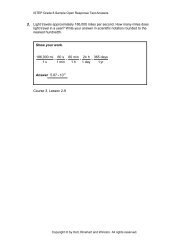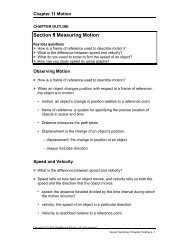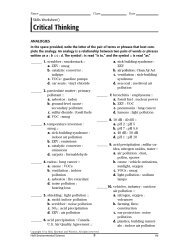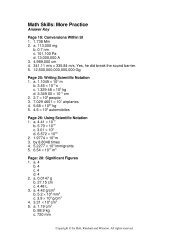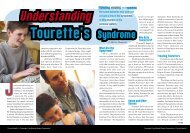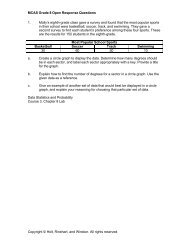Cramming on Ritalin
Cramming on Ritalin
Cramming on Ritalin
Create successful ePaper yourself
Turn your PDF publications into a flip-book with our unique Google optimized e-Paper software.
y Nancy Dreher<br />
It was three days before<br />
finals, <strong>on</strong> an evening last<br />
January. A girls’ basketball<br />
game was where the noisy<br />
acti<strong>on</strong> was in the southeast<br />
Pennsylvania high school. But<br />
in a quiet hall nearby, an<br />
inc<strong>on</strong>spicuous security camera<br />
was recording a theft in<br />
progress.<br />
The camera was taking pictures<br />
of a junior at the school<br />
sneaking out of the nurse’s<br />
office. In his possessi<strong>on</strong>, police<br />
would later charge, were more<br />
than 300 pills of the prescripti<strong>on</strong><br />
drug <strong>Ritalin</strong> and other<br />
medicati<strong>on</strong>s. The pills had<br />
been stolen from a locked medicine<br />
cabinet where they were<br />
stored for students authorized<br />
to receive them from the nurse<br />
during the school day.<br />
A c<strong>on</strong>necti<strong>on</strong> was drawn<br />
between the pills and final<br />
exams. <strong>Ritalin</strong>, known generically<br />
as methylphenidate and<br />
widely prescribed to treat<br />
attenti<strong>on</strong> deficit hyperactivity<br />
disorder (ADHD), is also used<br />
illegally by people who do not<br />
have ADHD. The drug, a stimulant,<br />
is often abused by people<br />
who believe it helps them<br />
When taken as<br />
prescribed, <strong>Ritalin</strong> is a<br />
valuable medicati<strong>on</strong>.<br />
Taking it as a<br />
study aid or<br />
party drug is a big<br />
health risk.<br />
to focus and stay alert l<strong>on</strong>ger<br />
to cram for exams, write a<br />
paper…or party.<br />
A Str<strong>on</strong>g, Potentially<br />
Dangerous Stimulant<br />
<strong>Ritalin</strong> has made its way<br />
into the hands of those who<br />
d<strong>on</strong>’t need it as medicati<strong>on</strong>,<br />
and the results can be disastrous.<br />
When taken according to<br />
a physician’s instructi<strong>on</strong>s by<br />
some<strong>on</strong>e who needs it as medicine,<br />
<strong>Ritalin</strong> has a mild to moderate<br />
stimulating effect. But<br />
when it is ground into powder<br />
and snorted, the drug has a<br />
Copyright © by Weekly Reader Corporati<strong>on</strong> • Current Health 2
<strong>Ritalin</strong><br />
and ADHD<br />
<strong>Ritalin</strong> is the best known of several<br />
drugs used to treat attenti<strong>on</strong> deficit<br />
hyperactivity disorder (ADHD). The<br />
medicati<strong>on</strong> can have a calming effect<br />
<strong>on</strong> hyperactive children and a<br />
“focusing” effect <strong>on</strong> those with<br />
ADHD.<br />
“When taken as prescribed,<br />
<strong>Ritalin</strong> is a valuable medicine,” says<br />
a statement from the Nati<strong>on</strong>al<br />
Institute <strong>on</strong> Drug Abuse. “Further,<br />
research funded by the Nati<strong>on</strong>al<br />
Institute of Mental Health has shown<br />
that people with ADHD do not get<br />
addicted to their stimulant medicati<strong>on</strong>s<br />
at treatment dosages.”<br />
Because <strong>Ritalin</strong> and other stimulant<br />
medicines have a potential for<br />
abuse, the U.S. Drug Enforcement<br />
Administrati<strong>on</strong> (DEA) has placed<br />
stringent c<strong>on</strong>trols <strong>on</strong> their manufacture,<br />
distributi<strong>on</strong>, and prescripti<strong>on</strong>.<br />
str<strong>on</strong>g stimulant effect.<br />
“The drug enters the body<br />
much quicker,” says Dr. Eric<br />
Heiligenstein, clinical director<br />
of psychiatry at the University<br />
of Wisc<strong>on</strong>sin’s Health Services.<br />
“At that point, the standard<br />
rati<strong>on</strong>ale that <strong>Ritalin</strong> is a safe<br />
drug is thrown out the door.<br />
When you take it intranasally,<br />
you are basically in uncharted<br />
places in the sense of how it<br />
affects you as an individual—<br />
your cardiac system and nervous<br />
system.”<br />
Used as a party drug,<br />
<strong>Ritalin</strong> is especially dangerous,<br />
even lethal. In Roanoke,<br />
Virginia, a 19-year-old died<br />
after snorting crushed-up<br />
<strong>Ritalin</strong> pills at a party <strong>on</strong>e<br />
night in April 1995. He was<br />
in cardiac arrest when taken<br />
to a hospital emergency room,<br />
where he was resuscitated<br />
and then put <strong>on</strong> life support.<br />
Eighteen hours later, he died.<br />
The U.S. Drug Enforce-<br />
ment Administrati<strong>on</strong> (DEA)<br />
has reported deaths in<br />
Mississippi and Virginia<br />
associated with snorting<br />
methylphenidate.<br />
Serious Health Effects<br />
Other bad things can happen<br />
when <strong>Ritalin</strong> is abused.<br />
Even when taken improperly<br />
in pill form (not snorted),<br />
methylphenidate can have serious<br />
health c<strong>on</strong>sequences.<br />
Dr. Heiligenstein recalls the<br />
case earlier this year of a student<br />
who came in after exam<br />
time, complaining of dizziness<br />
and unsteadiness. It took a few<br />
appointments before the student<br />
disclosed he had taken<br />
four times his usual prescribed<br />
dose of <strong>Ritalin</strong> to help him<br />
study.<br />
“The student was an example<br />
of how a pers<strong>on</strong> (who misuses<br />
<strong>Ritalin</strong>) can get overstimulated,<br />
panicky,” says Dr.<br />
Heiligenstein, describing comm<strong>on</strong><br />
symptoms of abuse. “All<br />
parts of the body are stimulated.<br />
Some people get rapid<br />
heart rates. Some are itchy and<br />
jumpy and <strong>on</strong> edge. They look<br />
that way too; they look<br />
‘wired.’”<br />
There is the problem, too, of<br />
withdrawal. “Any drug has an<br />
acti<strong>on</strong>,” says Dr. Heiligenstein,<br />
“and when use stops, there is<br />
the body’s reacti<strong>on</strong>. There can<br />
be significant irritability, slow-<br />
Current Health 2 • Copyright © by Weekly Reader Corporati<strong>on</strong><br />
ing of thinking, and moods<br />
that tend to be quite variable<br />
and low. People [tend to] think<br />
about the problems associated<br />
with taking the drug, but there<br />
are also substantial problems<br />
<strong>on</strong>ce it wears off.”<br />
Dr. William Bailey, head of<br />
the Indiana Preventi<strong>on</strong><br />
Resource Center at Indiana<br />
University, points out other<br />
complicati<strong>on</strong>s of abuse. For<br />
example, <strong>Ritalin</strong> tablets come<br />
in doses of 5 mg to 20 mg of<br />
methylphenidate. To make the<br />
tablets big enough to handle,<br />
additi<strong>on</strong>al “inert ingredients”<br />
are added. These ingredients<br />
are inert (inactive) if swallowed,<br />
but they can cause reacti<strong>on</strong>s<br />
if snorted or injected<br />
intravenously.<br />
For example, the tablets<br />
c<strong>on</strong>tain the hydrochloride salt<br />
of methylphenidate, which<br />
becomes hydrochloric acid<br />
when it comes in c<strong>on</strong>tact with<br />
moisture. This reacti<strong>on</strong> does<br />
not cause a problem when<br />
swallowed tablets dissolve in<br />
the stomach, where hydrochloric<br />
acid already exists as an<br />
acid that aids in digesti<strong>on</strong>.<br />
However, when <strong>Ritalin</strong> is<br />
snorted, this reacti<strong>on</strong> takes<br />
place in the moist nasal passages.<br />
The resulting acid can<br />
damage delicate nasal tissues,<br />
causing sores and nose bleeds,<br />
and even lead to deteriorati<strong>on</strong><br />
of the nasal cartilage.<br />
Problems with Addicti<strong>on</strong><br />
Abusing <strong>Ritalin</strong> can also<br />
become addictive—a fact readily<br />
acknowledged by young<br />
people who have been interviewed<br />
about their use. The<br />
DEA has found that abusing<br />
the drug makes a pers<strong>on</strong> more<br />
tolerant of it. This means more<br />
of the drug is then necessary to<br />
produce the same effect a<br />
smaller amount <strong>on</strong>ce had. The<br />
DEA also refers to “severe psychic<br />
dependence,” creating a<br />
mental state in which a pers<strong>on</strong><br />
believes the drug is vital for<br />
performing important tasks,<br />
such as studying or writing<br />
papers.<br />
The abuse of <strong>Ritalin</strong><br />
increased during the 1990s, a<br />
trend that coincided with a<br />
huge rise in the number of prescripti<strong>on</strong>s<br />
written to treat<br />
ADHD. Between 1990 and<br />
1995, the number of prescripti<strong>on</strong>s<br />
for the drug increased by<br />
600 percent, according to the<br />
DEA.<br />
As greater amounts of the<br />
medicati<strong>on</strong> are being dispensed,<br />
it has become more<br />
readily available to people<br />
who do not need it as medicine.<br />
Sometimes people who<br />
have prescripti<strong>on</strong>s for the pills<br />
give them away or trade them<br />
for other drugs. <strong>Ritalin</strong> is also<br />
sold illegally, and—as was the<br />
case in Pennsylvania and in<br />
other places around the country—it<br />
is often stolen. The DEA<br />
reports that methylphenidate<br />
ranks in the top 10 frequently<br />
reported c<strong>on</strong>trolled pharmaceuticals<br />
stolen from licensed<br />
handlers.<br />
The theft of drugs can obviously<br />
have legal c<strong>on</strong>sequences.<br />
The student in the Pennsylvania<br />
school, for example,<br />
was charged with burglary,<br />
criminal trespass, receiving<br />
stolen property, and theft—<br />
and he was expelled from<br />
school.<br />
Even giving away the<br />
drugs is against the law.<br />
Dr. Heiligenstein believes in<br />
spreading the clear message<br />
that methylphenidate is a c<strong>on</strong>trolled<br />
substance, and its possessi<strong>on</strong><br />
and use are restricted<br />
by law. “You d<strong>on</strong>’t share<br />
pills,” he says. “Your medicine<br />
is your resp<strong>on</strong>sibility.” ✦<br />
Rx<br />
Abuse<br />
Abuse<br />
<strong>Ritalin</strong> is hardly the <strong>on</strong>ly prescripti<strong>on</strong> drug with a reputati<strong>on</strong><br />
for abuse. A 2001 report issued by the Nati<strong>on</strong>al<br />
Institute <strong>on</strong> Drug Abuse stated that an estimated 4 milli<strong>on</strong><br />
people ages 12 and older used prescripti<strong>on</strong> drugs for<br />
n<strong>on</strong>medical reas<strong>on</strong>s in 1999.<br />
Three classes of prescripti<strong>on</strong> drugs are most comm<strong>on</strong>ly<br />
abused:<br />
• opioids, most often prescribed to treat pain<br />
• central nervous system depressants, used to<br />
treat anxiety and sleep disorders<br />
• stimulants (which include methylphenidates),<br />
prescribed to treat ADHD and the sleep disorder<br />
narcolepsy<br />
The report said data indicate that the most dramatic<br />
increase in new users of prescripti<strong>on</strong> drugs for n<strong>on</strong>medical<br />
purposes occurred in the 12- to 17-year-old and<br />
18- to 25-year-old age groups.<br />
Copyright © by Weekly Reader Corporati<strong>on</strong> • Current Health 2


